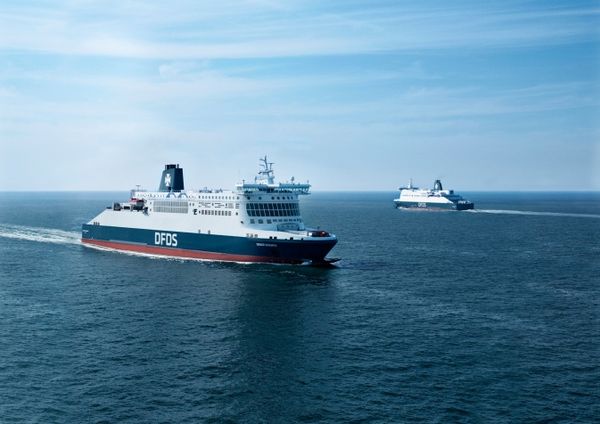News | Verband der Fährschifffahrt
Aufrufe
04.2024
04.2024
04.2024
04.2024
04.2024
04.2024
04.2024
04.2024
04.2024
04.2024
03.2024
03.2024
03.2024
03.2024
03.2024
03.2024
03.2024
03.2024
03.2024
03.2024
03.2024
03.2024
02.2024
02.2024
02.2024
DFDS to deploy fleet of battery electric vessels on the English Channel

DFDS reaffirms commitment to the electrification of cross-channel transport after meeting with UK Minister for Investment and Regulatory Reform, Lord Dominic Johnson. DFDS's long-term goal is to have up to six battery-powered vessels operating on its routes on the Channel, with the first two in service by 2030.
Today, the UK Minister for Investment and Regulatory Reform visited DFDS headquarters in Copenhagen, Denmark to discuss decarbonisation of the shipping sector and the electrification of maritime traffic across the English Channel.
DFDS will deploy two battery-powered vessels in the Eastern Channel by 2030. This is a part of a program to invest in six green vessels – two methanol, two ammoniac and two electric – for a total of around DKK 7.3bn over the next six years. The long-term goal is to introduce up to six fully electric vessels on the channel, which would be the world's largest electric ferries.
Because of the relative short distance between the UK and the European continent, the routes on the channel are optimal for electric ferry transport. The English Channel is one of the busiest shipping corridors in the world. It links two of the world’s biggest economies and accounts for 33% of the trade between the EU and the UK.
UK Minister for Investment and Regulatory Reform, Lord Dominic Johnson said:
“With its superb infrastructure, technological advances and proximity to Denmark, the UK is the partner of choice for green investments like this. DFDS’ commitment highlights the value of our trading relationship and the strategic importance of the English Channel shipping route.”
“The UK Government remains steadfast in its aim to reach net zero by 2050 and the green transition of the cross-Channel shipping will create British and Danish jobs and strengthen both our economies.”
The green transition of maritime transport on the Channel not only relies on the ships at sea. A sufficient power supply on land and infrastructure to accommodate recharging facilities in ports are equally important to be able to complete the fleet electrification.
“We have a shared ambition with the UK Government to decarbonise maritime traffic across the channel. The transition is not going to be easy. It requires significant investments in innovation, technology and infrastructure, and collaboration and partnerships between the public and private sectors. But I am confident that we will succeed. DFDS will invest in green vessels and cooperate with ports and governments on both sides of the channel to decarbonise cross channel transportation,” says Torben Carlsen, CEO of DFDS.
DFDS has 12 routes connecting UK to France, Germany, The Netherlands, Sweden and Denmark and employs 3,300 people in 5 ports, several logistics offices in the UK and onboard 3 UK flagged vessels.
Link to the original press release of DFDS.
Text & Pictures ©: DFDS


Kommentare
04.2024